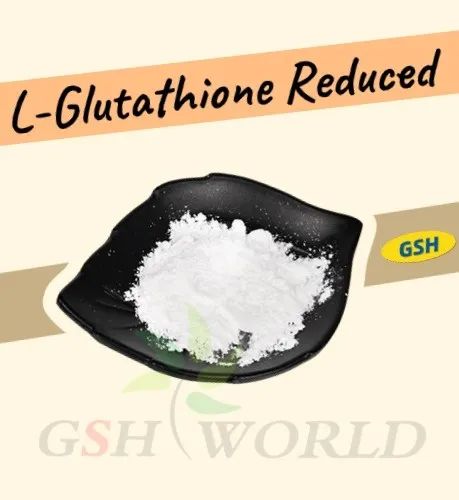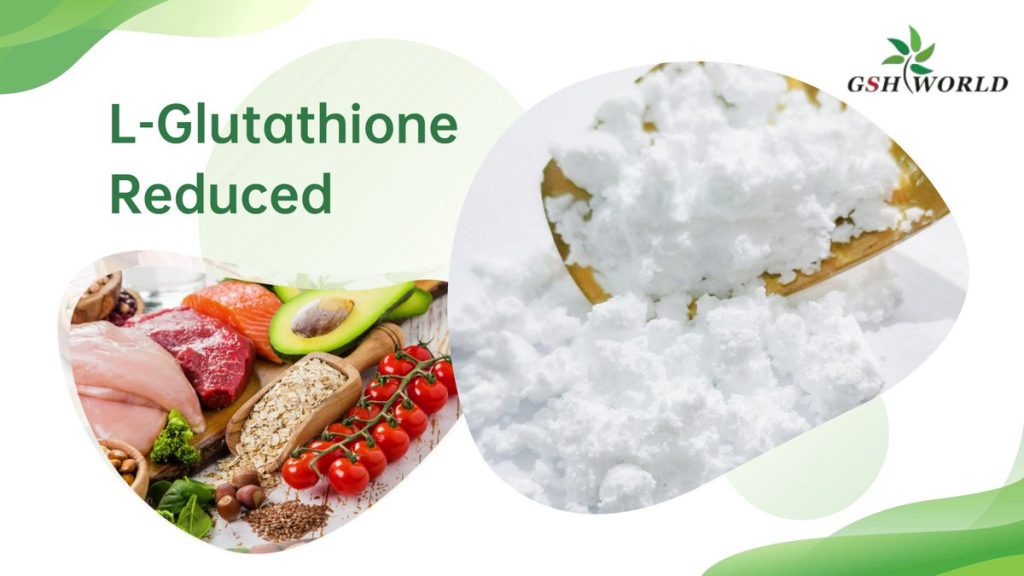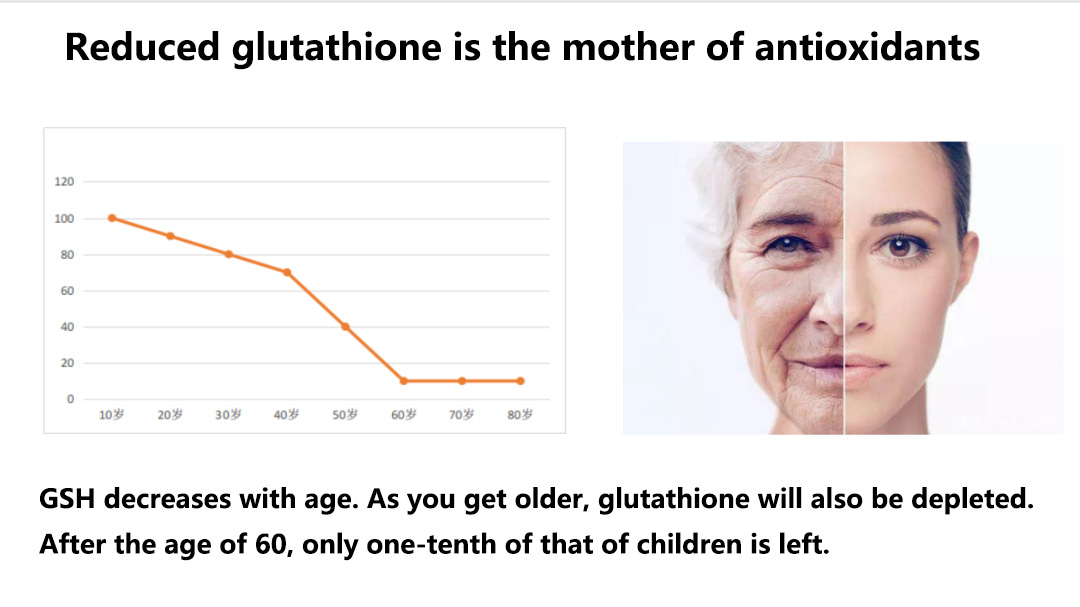Glutathione is widely present in animals and plants, and plays an important role in living organisms.
1、role of glutathione
The content is very high in bread yeast, wheat germ, and animal liver, reaching 100-1000mg/100g, in human blood 26-34mg/100g, in chicken blood 58-73mg/100g, and in pig blood 10-15mg/100g.
The content is also high in tomatoes, pineapples, and cucumbers (12-33mg/100g), but low in sweet potatoes, mung bean sprouts, onions, and shiitake mushrooms (0.06-0.7mg/100g).
The excessive free radicals produced by the metabolism of the body will damage the biological membrane, invade the life macromolecules, accelerate the aging of the body, and induce the generation of tumors or atherosclerosis. Glutathione plays an important role in the biochemical defense system of the human body and has multiple physiological functions. Its main physiological function is to eliminate free radicals in the human body, serving as an important antioxidant in the body, protecting the sulfhydryl groups in many proteins and enzymes.
The structure of GSH contains an active thiol SH, easily oxidized and dehydrogenated, making it the main free radical scavenger in the body.
GSSG, under the action of glutathione reductase present in the liver and red blood cells,
receives H to reduce to GSH, allowing the free radical scavenging reaction in the body to continue.
Glutathione not only eliminates free radicals in the human body, but also enhances the immune system.

Glutathione can also protect hemoglobin from oxidation by hydrogen peroxide, free radicals,
and other factors, enabling it to continuously and normally transport oxygen.
Under the action of oxidants such as hydrogen peroxide, some hemoglobin in red blood cells oxidizes divalent iron to trivalent iron,
causing hemoglobin to transform into methemoglobin, thereby losing its ability to carry oxygen.
Reduced glutathione can directly bind with oxidants such as hydrogen peroxide to generate water and oxidized glutathione, as well as reduce methemoglobin to hemoglobin.
There is a high content of glutathione in human red blood cells,
glutathione of great significance in protecting the thiol groups of proteins on the red blood cell membrane from being reduce
2、Application of Glutathione
Glutathione has broad-spectrum detoxification effect, can not only be used as a drug, but also as a base materi.
widely used in functional foods such as delaying aging, enhancing immunity, and anti-tumor.
Clinical Drugs
Glutathione drugs have been artificially developed and widely used in clinical practice. In addition to using its thiol group to chelate heavy metals, fluoride, mustard gas and other toxins for poisoning,
they are also used as therapeutic or adjuvant drugs for hepatitis, hemolytic diseases, as well as keratitis, cataracts, and retinal diseases. In recent years, Western scientists, especially Japanese scholars, have found that glutathione has the function of inhibiting HIV.
The latest research also shows that GSH can correct the imbalance of acetylcholine and cholinesterase, play an anti allergic role,
prevent skin aging and pigmentation, reduce melanin formation, improve skin antioxidant capacity, and make the skin shiny. In addition, GSH has a good effect in treating eye corner membrane disease and improving sexual function.

And vitamin C
In addition, vitamin C is also an important antioxidant in the body.
Due to the reversible hydrogenation or dehydrogenation of vitamin C,
it plays an important role in many redox reactions in the body.
For example, the active group of many enzymes is sulfhydryl (- SH), and vitamin C can maintain – SH in a reducing state while maintaining enzyme activity;
Vitamin C can convert oxidized glutathione into reduced glutathione (GSH), reducing the hydrogen peroxide (H2O2) produced by the body’s metabolism;
Vitamin C can also protect vitamins A, E, and certain B vitamins from oxidation. Therefore, when using glutathione in combination with vitamin C, its efficacy can be improved.
3、Glutathione anti-aging and beauty
The most direct manifestation of human aging is through appearance. The external manifestations are skin relaxation, lack of luster, and the appearance of color spots.
The internal changes are caused by the accelerated aging and regeneration ability of cells, as well as the deposition of pigments.
Glutathione can effectively delay cell aging and accelerate cell regeneration.
At the same time, glutathione can also affect the activity of tyrosinase in skin cells and inhibit melanin production, Prevent the generation of skin pigmentation.
Aging of the human body: Aging is an inevitable law in the development of human life. Generally, people start aging after the age of thirty.
① Glutathione can enhance or promote the secretion of interleukin (human growth hormone). Interleukins can regulate and slow down the shortening of telomeres, extend cell lifespan, and thus extend human lifespan.
② Glutathione is a strong antioxidant that can resist the damage of free radicals to DNA mitochondria and repair damaged DNA mitochondria;
This prolongs the cell division cycle and prolongs cell life.
③ Elevating glutathione levels, neutralizing and clearing free radicals, enhancing the glycolysis and oxidative phosphorylation processes of sugars,
while also inhibiting the glycation of proteins and fats, alleviating gluconeogenesis, and maintaining protein invariance.

4、Pharmacological toxicity of glutathione
Pharmacodynamic reduced glutathione (GSH) naturally synthesized peptide in human cells, composed of glutamic acid, cysteine, and glycine.
contains thiol (- SH) and widely distributed in various organs of the body, playing an important role in maintaining cellular biological function.
It is a co group of glyceraldehyde phosphate dehydrogenase and also a glutaraldehyde enzyme (such as thiol (- SH) enzyme),
which promotes the metabolism of sugar, fat, and protein, and can affect the metabolic process of cells.
It can combine with free radicals in the body to convert into easily metabolized acids, thereby accelerating the excretion of free radicals,
helping to reduce the toxic side effects of chemotherapy and radiation,
but has no significant impact on the efficacy of chemotherapy and radiation, Moreover, it has a significant therapeutic effect on radiation induced enteritis.
For patients with systemic or local hypoxemia caused by anemia, poisoning, or tissue inflammation,
it can reduce tissue damage, promote repair, and protect the liver’s synthesis, detoxification, inactivation of hormones, and promote bile acid metabolism.
It is beneficial for the digestive tract to absorb fat and lipophilic vitamins (A, D, E, K) through the methylation and transamination reactions.
General pharmacology:
Intravenous injection of 300mg/kg reduced glutathione sodium salt into hybrid dogs did not affect arterial pressure, cardiac dynamics, and respiratory frequency. Intraperitoneal injection of 80mg/kg reduced glutathione sodium salt into rats did not significantly affect gastrointestinal function. 3. Pharmacological animal experiments have shown that this product has no acute toxicity, long-term toxicity, or reproductive toxicity.



